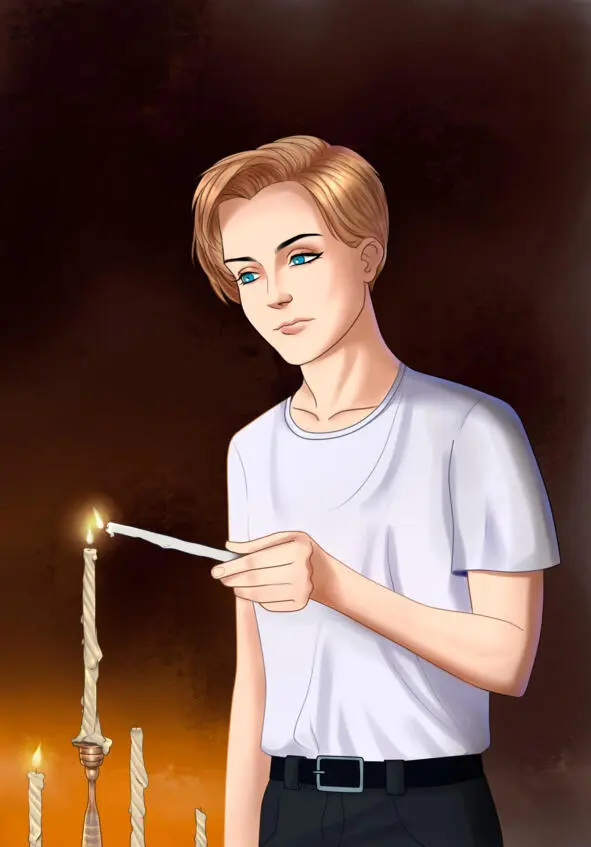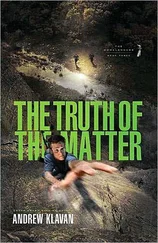“Where did you come from?” the boy echoed and then, after a pause, he added, this time skipping the interrogative intonation: “Where I came from.”
He seemed to savor the words, tasting, chewing and swallowing them.
“What is your name?” the priest asked and gave him a friendly smile.
“What is your name?” the boy repeated the question, deliberately putting an emphasis on the third word.
“My name,” the priest tapped his finger on his chest and said clearly and distinctly, “is Father Konstantin.” He waited for a minute, giving the boy time to memorize the words. He could see him moving his lips. And then he asked the question again, clearly and making pauses: “And what is your name?”
“And my name…” the boy mirrored the priest’s gesture and tapped his finger on his chest, “is… Vlad!”
“Vlad… It’s a good name,” the priest said approvingly.
“Your name is good too,” the little boy said. “A significant one!”
“Whose are you?” Father Konstantin held out his hand to the boy.
“Yours,” Vlad said, standing up.
Hand in hand, they went home, a grown man and a little boy.
9 years later, Molyobka village
June was slowly coming to an end in the small village of a hundred households. The intense summer sun was shining and its light was refracting and dispersing in raindrops sparkling on emerald green leaves after the morning thunderstorm.
The church was the main attraction of the village. Made of logs, designed as an Old Russian tower house, it was the spiritual center for the congregation of the whole village, filling the surroundings with the silvery clamor of bells.
This time Father Konstantin was conducting the morning service, and the parishioners were praying for their nearest and dearest, begging for forgiveness for the mistakes they made, crossing themselves and bowing. Some of them were standing and reading the prayer in front of the icons, others were silently sitting on the benches along the wall near the door.
Turning his face to the congregation and blessing the people, the father cast a casual glance at the church choir, which was led by a boy of about twelve years old. There was nothing special about the boy: He was lean-bodied, with greyish blue eyes and neatly combed fair hair. His young age seemed to be no problem for the young choirmaster.
High-pitched and clear children’s voices filled the church with the crystal-clear sound. The harmoniously intertwined voices flowed freely over the church, reaching the ears and passionate hearts of each and every grateful listener. It seemed impossible that a child could lead the choir of regular village boys with such confidence. Smooth, but expressive movements of his hands led the church choir, as if he and the choirboys were a single whole. The melody was flowing, giving a sense of peace to everyone in the church and filling their hearts with light.
When the sermon was over and the congregation left the church, the priest disappeared behind the holy doors. Meanwhile the choirboys came down from the balcony. Most of them immediately changed into their casual clothes and hastened home. The young choirmaster did not leave and settled down to the usual novitiate work: He put away the burnt-out candles, fixed a crooked icon, and added fresh oil to the altar lamp.

Vladislav Viggin
“Vlad!” the priest called him. “Breakfast is on the table! Hurry up, son!”
“Alright, father!” Vlad replied.
He closed the psalter, reverently ran his hand over the artfully embossed leather binding, and went to the refectory at a leisurely pace.
Father Konstantin and Mark, the bell-ringer, were sitting at the table and talking quietly. The cook named Anna was putting the steaming porridge into plates.
The boy took his place and Father Konstantin began saying grace. The cook, standing by the table, and the bell-ringer closed their eyes, folded their arms on the chest and moved their lips while silently praying. Vlad was looking at Father Konstantin and echoing him, saying the prayer he knew by heart.
“Our merciful Lord, bless this food before us so that our souls could soar to you, our Lord, in their universal love! Amen!”
“Amen,” everyone repeated after him.
Mark was eating loudly and hastily. Father Konstantin and Vlad were eating tidily and without any haste. Anna was modestly standing by the table, taking some porridge with the tip of the spoon, and meditatively putting it in her mouth.
“What a singing it was today!” the bell-ringer exclaimed, unable to hold back his emotions. “But wait. It couldn’t be otherwise!”
Vlad gave a shy smile, but did not say a word.
“It used to be different. Many years ago, there weren’t even any choirboys,” Father Konstantin pointed out.
“Except for those two vociferous cockerels,” Mark said with a sniff.
The priest gave him a steady look.
“Don’t get me wrong, Father!” Mark crossed himself. “But you do remember how they used to wheeze, don’t you? I even spared a thought whether it was time to cast out demons from them!”
Father Konstantin only shook his head at this.
“There is no denying the truth, Father,” Anna said in a rather muffled voice. “It wasn’t very long ago that things started looking up, by the grace of God. The church is growing in numbers, and it is clean and tidy. The people seem to be more open-hearted.”
“And all the thanks should go to the boy!” Mark gave Vlad a wink, and the boy blushed all over.
“Uncle Mark, I don’t…”
“No, no, no, I won’t listen to it!” the bell-ringer covered his face with his hand in a dramatic gesture.
“He is right, my dear,” Anna cast him a smile and stroked his hair. “You are doing a lot for all of us. For the church and for the villagers.”
“Yeah, ‘at’s wha’ I’m ‘alking a’ou’! ” the bell-ringer made encouraging noises with his mouth full. “One canno’ coun’ i’ on ‘e fin’ers of one ghan’!”
“They are right,” Father Konstantin gave Vlad a sharp look. “You are humble, and it is very commendable. But people can see you doing your best. We have never had a church choir before. You turned regular village boys into choirboys, whose voices would be duly appreciated even in privileged circles. I lend my ears to the people who come here in my line of work. And guess what they say? They come not so much for the prayer, as for the choir. Your choir, Vlad.”
“But why?” the boy asked.
“You may not notice it, but when I stay there, downstairs, I marvel at the incredible concord of voices. These voices make people happier and kinder.”
Though they spoke highly of him, Vlad was sitting with his head low, as if they were chastising him.
“Not to mention this clear head full of knowledge. Father Konstantin, do you know many teachers who could teach reading and writing, the Bible, mathematics and other sciences at a parish school at this age?” Mark kept harping on the same old theme.
Vlad shrugged his shoulders in embarrassment. He genuinely struggled to understand what he had done to deserve such praise. He had been doing all of this without effort; moreover, he felt he was wasting time.
From his first day in the house of Father Konstantin, he was very passionate about every book he got hold of. Within a short time, he learnt the art of reading and writing, and read all the books in the local library. He read everything and anything, ecclesiastical writing, theology and philosophy books, geographic atlases, and periodicals. He had an amazing memory and could remember the texts by heart almost word for word. But when he was retelling these books to his peers, he didn’t do it parrot-fashion; he was able to explain the main idea, conveying it in simple words, which could be understood even by a bell-ringer or a cook. No one asked him to do anything, but very soon he was the center of attention of village boys and girls. They did not come to him for fun and play. They came to listen to his never-ending stories. That is how he became their teacher. Father Konstantin was happy to entrust him with the keys from the classroom.
Читать дальше












